
Food Science and Human Wellness
Scope & Guideline
Transforming Knowledge into Nutritional Solutions
Introduction
Aims and Scopes
- Gut Microbiota and Health:
Research exploring the relationship between dietary components, gut microbiota, and various health outcomes, particularly how changes in gut flora can influence metabolic disorders, immunity, and overall health. - Functional Foods and Bioactive Compounds:
Investigation of food-derived bioactive compounds, such as peptides, polysaccharides, and polyphenols, and their roles in promoting health, preventing diseases, and modulating physiological functions. - Nutritional Biochemistry:
Studies focused on the biochemical pathways of nutrients and their effects on health, including mechanisms of action for various dietary components in the prevention and management of chronic diseases. - Food Safety and Quality:
Research on the safety aspects of food products, including the detection of foodborne pathogens, allergens, and the impact of food processing methods on nutritional quality. - Innovative Food Technologies:
Exploration of new technologies in food processing, preservation, and packaging, particularly those that enhance nutritional value and safety. - Dietary Interventions and Health Outcomes:
Clinical and epidemiological studies assessing the impact of specific dietary interventions on health markers, including metabolic syndrome, obesity, diabetes, and cardiovascular health.
Trending and Emerging
- Microbiome Research:
A significant increase in studies focusing on the human microbiome, particularly its role in health and disease, gut-brain axis interactions, and the impact of dietary interventions on microbial diversity. - Personalized Nutrition:
Emerging research on personalized nutrition, which tailors dietary recommendations based on individual genetic, microbiome, and health profiles, is gaining traction within the journal. - Plant-Based Diets and Health:
Growing interest in the health benefits of plant-based diets, including studies on specific plant-derived foods and their bioactive compounds, particularly in relation to chronic disease prevention. - Functional Foods for Chronic Disease Management:
An upward trend in research on functional foods designed to prevent or manage chronic diseases, emphasizing their physiological effects and health benefits. - Sustainable Food Practices:
Research exploring sustainable food systems, including the environmental impact of food production and consumption patterns, is increasingly featured, reflecting a broader societal concern.
Declining or Waning
- Traditional Food Processing Methods:
Research focused on traditional food processing techniques is becoming less prevalent as the emphasis shifts towards innovative and modern methods that enhance food safety and nutritional quality. - General Nutritional Guidelines:
Studies providing broad nutritional guidelines without specific focus on biochemical mechanisms or health outcomes are declining, as there is a growing preference for detailed, mechanistic explorations. - Food Sensory Analysis:
While still relevant, the focus on sensory analysis of food products is diminishing compared to more integrated approaches that consider sensory attributes in conjunction with health impacts and consumer behavior. - Animal Studies in Nutrition Research:
The reliance on animal models for nutritional studies is decreasing, with a growing emphasis on human clinical trials and epidemiological studies that provide more directly applicable findings.
Similar Journals

Acta Scientiarum Polonorum-Technologia Alimentaria
Showcasing Excellence in Food Technology InnovationsActa Scientiarum Polonorum-Technologia Alimentaria, published by Poznan University of Life Sciences, is a revered journal in the field of food science, showcasing cutting-edge research and innovations in food technology. Established as a leading platform within its domain, this journal is indexed under Scopus and ranks in the 2023 Q3 quartile for Food Science, demonstrating its commitment to high-quality scholarship. With an ISSN of 1644-0730 and E-ISSN 1898-9594, it serves as a critical resource for researchers, professionals, and students seeking to stay at the forefront of advancements in food safety, quality control, and sustainable practices. The journal has also been recognized for its contributions to the agricultural and biological sciences, positioning itself at rank #205 out of 389 in this competitive field. While currently not offering open access, the journal's valuable insights and findings, especially as it publishes through 2024, play a crucial role in advancing knowledge and fostering collaboration among experts in the food science sector.

Functional Foods in Health and Disease
Pioneering Research at the Crossroads of Food and MedicineFunctional Foods in Health and Disease is a respected peer-reviewed journal published by FUNCTIONAL FOOD CENTER INC, dedicated to advancing research in the fields of biochemistry, food science, medicine, and nutrition. Since its inception in 2011, this journal has provided a platform for innovative studies that connect the impact of functional foods on health and disease outcomes. With a focus on interdisciplinary research, it aims to disseminate knowledge that enhances the understanding of how specific food components can influence health and well-being. The journal is indexed with an ISSN of 2160-3855 and annually ranked in several categories, including Q4 in Biochemistry and Q3 in Food Science, Medicine, and Nutrition and Dietetics for 2023. As an open access publication, it ensures that research is widely accessible, which is crucial for fostering collaboration and discussion within the scientific community. This journal is a vital resource for researchers, practitioners, and students seeking to explore the dynamic role of functional foods in health promotion and disease prevention.

Ukrainian Food Journal
Fostering collaboration in food science and biochemistry.Ukrainian Food Journal is an esteemed open-access journal dedicated to advancing the field of food science and biochemistry. Established in 2012 and published by the National University of Food Technologies in Ukraine, the journal serves as a vital platform for researchers and professionals to disseminate their findings on food technology, safety, and nutritional biochemistry. With an ISSN of 2304-974X and E-ISSN 2313-5891, it offers a wealth of knowledge to its readers, promoting innovation and collaboration within the industry. While currently categorized within the Q4 quartile of biochemistry and the Q3 quartile of food science, the journal is progressively gaining recognition, reflecting a commitment to quality research in a competitive field. The journal is indexed in Scopus, ranking #271 in Food Science and #376 in Biochemistry, underscoring its relevance and contribution to agricultural and biological sciences. The Ukrainian Food Journal not only enriches the academic community with its open-access model but also aims to foster dialogue among researchers, professionals, and students dedicated to improving food systems and nutrition. It operates from its headquarters in Kyiv, offering a hub for creativity and advancement in food-related research.
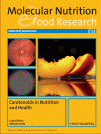
MOLECULAR NUTRITION & FOOD RESEARCH
Leading the Charge in Food Science and Nutritional Advancements.MOLECULAR NUTRITION & FOOD RESEARCH, published by Wiley, is a premier journal dedicated to the rapidly evolving field of food science and nutrition. With an impressive impact factor and a consistent position in the Q1 category for both Biotechnology and Food Science in 2023, this journal stands out as a leading platform for researchers, professionals, and students alike. The scope encompasses a comprehensive range of topics from molecular nutrition to innovative food research, with a focus on translating scientific insights into practical applications that enhance human health. As part of its commitment to accessibility, the journal offers open access options, allowing for wider dissemination and engagement with the academic community. Given its high ranking in Scopus—placing 42nd in Food Science and 62nd in Biotechnology—the journal plays a critical role in advancing knowledge and fostering collaboration in these essential fields. For over two decades, it has provided a vital forum for cutting-edge research, ensuring that each issue contributes significantly to the discourse around food and nutrition.
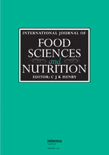
INTERNATIONAL JOURNAL OF FOOD SCIENCES AND NUTRITION
Fostering critical discussions in nutrition and health.International Journal of Food Sciences and Nutrition, published by Taylor & Francis Ltd, is a premier, peer-reviewed journal that has established itself as a leading platform for the dissemination of cutting-edge research in the field of food science and nutrition. With an impressive Q1 categorization and an academic rank of #59/389 in Scopus’s Agricultural and Biological Sciences category, this journal is recognized for its significant impact, facilitating critical discussions and advancements related to food quality, safety, and nutritional health. Its historical significance, covering research from as early as 1947 to the present day, underscores the journal's long-standing commitment to scientific rigor and innovation. Researchers and professionals benefit from this journal's comprehensive and diverse range of studies, contributing to informed practices and developments in the food industry and public health. Although the journal is not open access, it provides various access options, ensuring that high-quality research is available to academics and practitioners alike. Stay connected with current trends and breakthroughs in food sciences and nutrition through this highly respected publication.
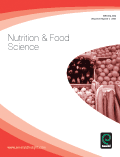
Nutrition & Food Science
Exploring the intersection of diet and technology.Nutrition & Food Science, published by EMERALD GROUP PUBLISHING LTD, is a prominent journal dedicated to advancing the understanding of nutritional science and food technology. With an ISSN of 0034-6659 and an E-ISSN of 1758-6917, this journal has provided a platform for scholarly articles, reviews, and insightful research since its inception in 1971. The journal is recognized in the Q3 quartile for both Food Science and Nutrition and Dietetics categories, showcasing its moderate impact within the field. Currently ranked #202 in Food Science and #81 in Nutrition and Dietetics based on Scopus metrics, it caters to a diverse audience of researchers, practitioners, and students eager to explore the latest findings and developments. While not an open-access journal, it offers various subscription options for individuals and institutions keen on accessing high-quality research. With a commitment to interdisciplinary collaboration and practical applications, Nutrition & Food Science is an essential resource for those invested in improving health outcomes through informed dietary practices and food innovations.
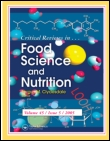
CRITICAL REVIEWS IN FOOD SCIENCE AND NUTRITION
Enhancing Understanding of Nutritional ScienceCRITICAL REVIEWS IN FOOD SCIENCE AND NUTRITION, published by Taylor & Francis Inc, is a premier peer-reviewed journal dedicated to advancing the understanding of food science and nutrition. With its ISSN 1040-8398 and E-ISSN 1549-7852, this influential journal has established itself as an essential resource in the field, featuring high-quality reviews and critical analyses that foster innovation and knowledge sharing among researchers, practitioners, and academics. Recognized as a Q1 journal in Food Science, Industrial and Manufacturing Engineering, and Medicine (miscellaneous) for 2023, it ranks impressively within the top percentiles of its respective fields, making it a valuable platform for impactful research. Although the journal does not currently offer open access, it continues to attract a readership eager to explore the intricacies of food science and its applications, thereby shaping future advancements in the industry. With an extensive history dating back to 1981 and convergence up to 2024, CRITICAL REVIEWS IN FOOD SCIENCE AND NUTRITION remains committed to providing comprehensive reviews that illuminate contemporary challenges and solutions in the domain of food science and nutrition.

Foods and Raw Materials
Innovating research at the intersection of food and veterinary science.Foods and Raw Materials is a premier open access journal published by Kemerovo State University in the Russian Federation, dedicated to advancing knowledge in the field of Food Science. Since its foundation in 2013, the journal has established itself as a significant platform for researchers and professionals, featuring groundbreaking studies and innovative findings in both food science and veterinary disciplines. With an impressive impact factor reflected in its 2023 Scopus rankings—where it holds a Q3 categorization and is positioned in the 83rd percentile in Veterinary General, and the 75th percentile in Agricultural and Biological Sciences—the journal serves as an essential resource for academics and practitioners alike. As it continues to evolve and converge through 2024, Foods and Raw Materials aims to foster interdisciplinary collaboration and provide a comprehensive forum for the dissemination of significant research that shapes the future of food safety, sustainability, and technology.
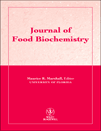
JOURNAL OF FOOD BIOCHEMISTRY
Contributing to the Future of Food Safety and QualityJOURNAL OF FOOD BIOCHEMISTRY, published by Wiley-Hindawi in the United Kingdom, is a premier peer-reviewed journal dedicated to advancing the scientific understanding of food biochemistry. With an extensive publication history spanning from 1977 to 2024, this journal aims to bridge the gap between food science and biochemistry, making significant contributions to the understanding of food structure and composition. The journal boasts impressive Scopus rankings, placing it within the top quartile in Food Science and Q2 in Biophysics and Pharmacology, affirming its influence in the field. Notably, it provides critical insights that are vital for researchers, professionals, and students aiming to explore the biochemical processes involved in food production and safety. Despite not being open access, the journal ensures wide distribution of high-quality research, fostering collaboration and innovation within the scientific community. The impact factor reflects its relevance and quality, further solidifying its status as a key resource for cutting-edge research in food biochemistry.
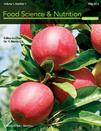
Food Science & Nutrition
Connecting agriculture and health through cutting-edge science.Food Science & Nutrition is an esteemed peer-reviewed journal published by WILEY, dedicated to advancing the fields of food science and nutritional research. With an impressive impact factor and a prestigious Q1 ranking in the Food Science category, this journal stands out as a leading platform for innovative research, offering meaningful insights into the relationship between food composition and health outcomes. Since its transition to Open Access in 2013, Food Science & Nutrition has championed the global dissemination of knowledge, ensuring that vital research is accessible to researchers, professionals, and students alike. With a vast scope that encompasses both agricultural and biological sciences, the journal provides a comprehensive view of emerging trends, methodologies, and applications in food security and nutrition, making it indispensable for those invested in these critical areas.